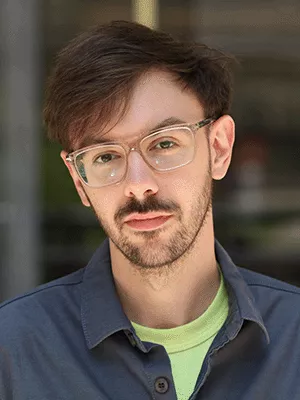
OVPR: What was the focus of your PhD?
Brandon Goulding: I completed a PhD in Developmental Psychology under the supervision of Dr. Ori Friedman at the University of Waterloo. I studied a few different things, but my main focus (in the end) was on how children reason about possibility. Specifically, I wanted to understand why children deny the possibility of strange or unlikely events. My work suggests that children will affirm strange events if the events are similar to something they know has already happened. (I also found that adults might do this, too—though that work was completed after I defended.)
OVPR: What skill do you think is most important for a PhD to learn before starting a PDF?
BG: Tough question. If you’re a doctoral student who wants to be a professor, you might aim to get a PDF after graduating regardless of whether you feel ready. But here are two recommendations I have for PhD students thinking about doing postdocs. First, get some experience being a team leader, and delegating tasks, if you can. I was sort of thrown for a loop when I started my PDF and suddenly had to manage a team of undergraduate students, because I’d never done anything like that before. I spent more time than I’d like to admit just worrying about how to be in charge of a project. And second, I’d recommend that you start thinking of everything you do as representing your projects, your line of work, your questions. This is may be more of a mindset than a skill, but it’s important. You’re kind of like a professor who just doesn’t have their own lab yet, and you’re meant to act somewhat independently. So think of this as an opportunity to get your work done, and think of the questions that you want to answer.
OVPR: What is the aim of your current research?
BG: I’m working on building a lab at The University of Winnipeg, and right now I’m still following up on my doctoral work. (There’s a lot to do!) I’ve just received an NSERC Discovery Grant to study how children reason about possibility (again). This time, I’m planning to focus on how children’s beliefs about possibility intersect with their causal knowledge and their reasoning about category membership. I’m also still collaborating with both my graduate and postdoctoral supervisors on multiple different projects. If you want to see my most recently published work, you can check out this paper.
OVPR: Why did you choose UTM for your PDF?
BG: I chose UTM for my PDF because I wanted to work with Dr. Samuel Ronfard. I started my first project on possibility judgments after reading one of his papers, and I’d met him a few times at conferences and thought he’d be a great person to work with. I was super happy when he got an appointment at UTM in 2019, and one of my first thoughts was: “I wonder if he’ll take me on as a postdoc when I graduate.” He did.
OVPR: What is one advantage you feel you gained through the UTM Postdoctoral Fellowship Award Program?
BG: I started to learn how to manage a team. I had almost zero leadership skills when I started, and I like to think I’m somewhat better off now. Though probably the biggest advantage was that I got to work with Dr. Ronfard, because I like working with him, we started a bunch of exciting projects together, and we’re continuing to work together even though I left and got a job (sorry, Samuel).
OVPR: What is your aspiration after completing this fellowship?
BG: Well, my aspiration while I had the fellowship was to get a job as an assistant professor. Which happened, so now the fellowship is (sadly) over, and I’m an Assistant Professor at The University of Winnipeg. I started my appointment on July 1, 2022. It’s been almost a year, and I spent most of that year finishing up old projects, writing grants, and prepping my first course. I’m now in the process of setting up a lab that I’m really excited about, and we’re going to start data collection in earnest this Fall. Stay tuned!
OVPR: What do you do outside of research to unwind?
BG: I usually play guitar for at least an hour a day; when I work at home, I often practice for a few minutes to take a break from whatever I’m working on. Otherwise, I read fiction, play video games, or go for walks. I joined a squash league and I’m not a great player but getting better (I hope). Lately I’ve been watching an absurd amount of Antiques Roadshow. I also often do absolutely nothing on Saturdays—this is the highlight of my week.
